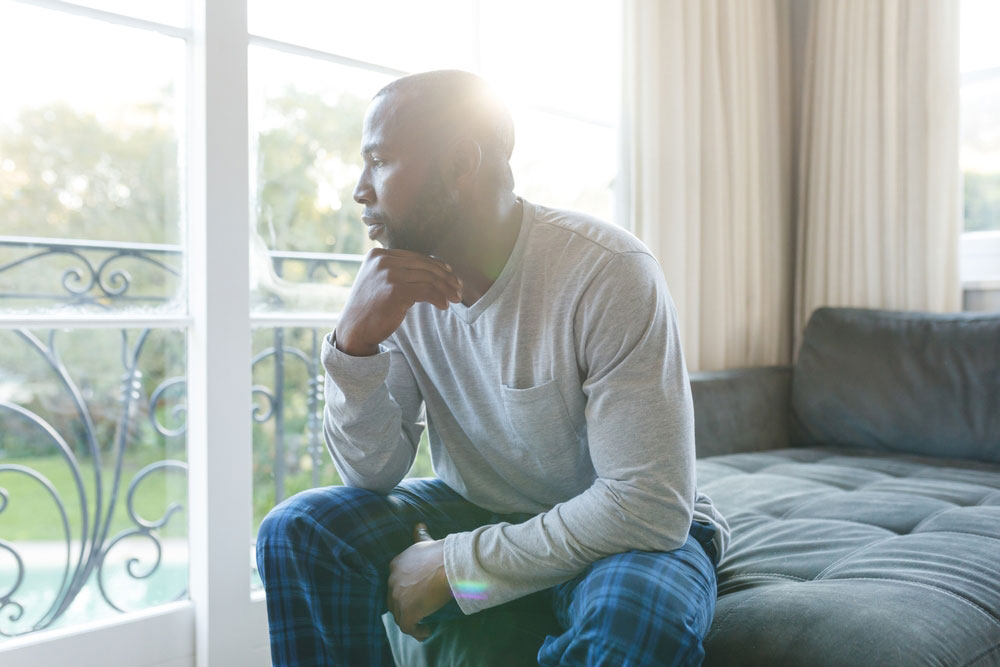Mental health challenges don’t discriminate by gender. Yet in our culture, there’s still a harmful misconception that mental illness is something only women struggle with – or that men who experience depression, anxiety, or trauma are weak or emotionally unstable. These beliefs are dangerously inaccurate.
Mental Health Awareness Month is a valuable chance to spotlight mental health disorders in men, why they might go unrecognized, and how untreated symptoms can lead to substance abuse, broken relationships, and isolation.
Why Men’s Mental Health Often Goes Undetected
Many men learn from an early age to suppress their feelings, avoid the perception of vulnerability, and “tough it out.” You may see emotional distress as something to ignore or manage silently. But burying your symptoms won’t make them go away – they will gradually worsen, eventually manifesting in unhealthy behaviors, substance use, or other self-destructive coping strategies.
Men tend to express their emotional pain differently than women. Instead of appearing sad or anxious, you might become:
- Irrationally angry or irritable
- Withdrawn or emotionally detached
- Overly focused on work or distractions
- Prone to reckless behavior or substance abuse
This disconnect between emotional suffering and outward behavior is a leading reason men’s mental health challenges so often go unrecognized and untreated.
Prevalent Mental Health Disorders in Men
1. Depression
Depression affects over 6 million men in the U.S. each year, but your symptoms may differ from the traditional signs. Instead of lethargy, anhedonia, or sadness, you may experience:
- Fatigue and low motivation
- Irritability and anger
- Trouble concentrating
- Changes in appetite or sleep
- Risky behavior or substance use
- A sense of hopelessness or emptiness
If you’re unwilling to reveal your feelings, depression can lead to serious consequences, including relationship breakdowns, job loss, or even a desire to end your life.
2. Anxiety Disorders
Anxiety in men can show up as chronic worry, muscle tension, restlessness, or obsessive thinking, but it may also take the form of:
- Perfectionism
- Control-seeking behavior
- Social withdrawal
- Avoidance of intimacy
- Panic attacks
Untreated anxiety can make it difficult to function in everyday life and often drives men to use alcohol or drugs to calm their nerves.
3. Post-Traumatic Stress Disorder
You can develop PTSD after experiencing or witnessing a traumatic event – something many men face through military service, childhood abuse, violence, or serious accidents. PTSD symptoms in men often include:
- Flashbacks or nightmares
- Hypervigilance and jumpiness
- Emotional numbness
- Angry outbursts
- Difficulty sleeping
Men with PTSD may isolate themselves, withdraw from loved ones, or rely on substances to cope with intrusive memories or emotional pain.
4. Bipolar Disorder
Bipolar disorder involves intense mood shifts between manic highs and depressive lows. During manic episodes, men may appear:
- Euphoric, charismatic, or overly ambitious
- Impulsive or reckless
- Unable to sleep or slow down
- Focused on unrealistic goals
During depressive periods, you may feel deeply fatigued, unmotivated, or hopeless. Hallmarks include a profoundly overwhelming sense of despair that lingers for extended periods. You could also have a heightened sense of self-doubt or regret, often disproportionate to reality.
The Overlap Between Mental Illness and Substance Abuse
Substance use often follows untreated mental health symptoms. Many men turn to alcohol, stimulants, or opioids to:
- Numb emotional pain
- Calm anxiety
- Feel energized or confident
- Escape shame, trauma, or pressure
This cycle can quickly lead to dependence, addiction, and worsening mental health, creating a dual diagnosis. Treating one without the other is rarely effective – which is why integrated wellness is critical.
How Legacy Texas Helps Men Heal
At Legacy Texas, we understand that mental health is equally as crucial as physical sobriety. We’ve built our program to treat your body, mind and spirit through:
- Comprehensive mental health assessments to uncover depression, anxiety, PTSD, and other conditions
- Integrated dual-diagnosis treatment to address substance use and co-occurring disorders
- Men-only therapy groups that encourage open conversation, emotional honesty, and connection
- Advanced behavioral therapies to reshape your thought patterns, manage symptoms, and build resilience
- Accountability and camaraderie through our structured community and aftercare hub, The Lyndon Club & Collective
We reject the notion that men shouldn’t ask for help. Here, real men put in the work, confront their pain, and build something better.
You Deserve to Feel Whole Again
Mental health disorders don’t make you weak – they make you human. If you feel lost, overwhelmed, or trapped in a cycle of substance use and emotional distress, you don’t have to keep carrying it alone.
We’re ready to help you heal, rediscover your purpose, and reclaim your life. Contact us today to learn more about our men’s-only recovery program and how we can support your mental and emotional wellness – this month and every month.

